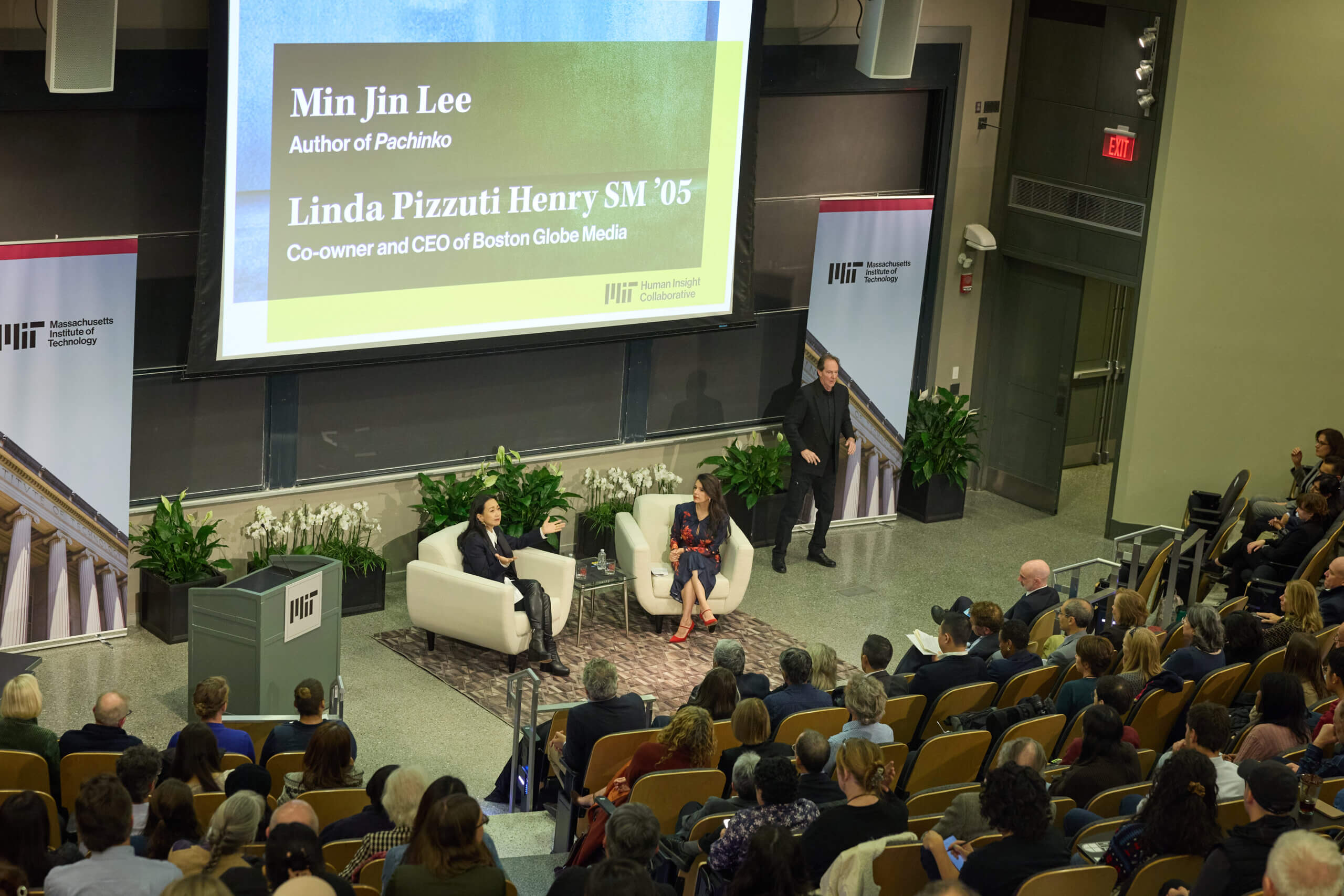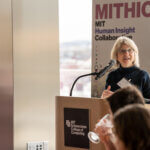At MITHIC launch, author Min Jin Lee champions the power of human-centered storytelling
The award-winning author of “Pachinko” shared insights on her approach to writing, the importance of human connection, and how her Korean identity informs her work.

Acclaimed author Min Jin Lee, speaking at the launch event for the MIT Human Insight Collaborative (MITHIC), described literature as a powerful tool that can connect people and fill in some of history’s blanks.
Lee was the featured speaker at the October 28 launch event for MITHIC, a new initiative that aims to elevate MIT’s human-centered disciplines and unite the Institute’s top scholars to help solve the world’s biggest challenges. The conversation was moderated by Boston Globe Media CEO Linda Pizzuti Henry SM ‘05.
“I put the human being at the center,” Lee told the audience in MIT’s Huntington Hall, connecting her writing approach to MITHIC’s mission.
Lee noted the unique way she opens each of her books: with a thesis statement. For her second book, “Pachinko,” a finalist for the National Book Award for fiction, it was: ‘History has failed us, but no matter’. The novel uses historical fiction to tell the story of a Korean family who immigrates to Japan and centers social challenges like racism, discrimination, and the pervasiveness of stereotypes.
Lee, who immigrated with her parents to the U.S. from Korea when she was seven, explained her thinking behind the novel’s opening line.
“Primary documentation…throughout most of written history was allowed to those who were literate, those who could have documentation, or could have other people write about them,” she said. “Therefore, mostly we know about winners and leaders and kings. We don’t know that much about regular people. Mostly we know nothing about women, not really. So I thought: history has failed us.”
Lee says her novels are a way for her to re-center the people history has left out.
“All the books that I write are really a response to the fact that I don’t see these stories that are really obvious to me, but not recorded in books,” she said.
Lee spoke about the power of writing as a means to change the world and how she wants her novels to bring attention to the issues that really matter, noting that the response to “Pachinko” is an example of how people can find meaning in stories, even those that don’t connect directly to their own experiences.
“I get these letters from so many people who are not Korean saying this is a story of my family,” she said. “I think people pay attention because they can connect with things that have nothing to do with their own backgrounds.”
“History has failed us but no matter.”
Lee, who is also a journalist and an educator, emphasized themes of intellectual curiosity, skepticism, a multidisciplinary approach to problem-solving, and critical analysis during her conversation. The Institute’s vision for MITHIC, like Lee’s conception of creativity, derives from the essential nature of human understanding in all aspects of life.
“If you don’t put the human at the center of what you do, you’re not going to be able to read the room. You’re not going to be able to read the other person,” she said.
Lee also described the challenges that public historians—such as educators and journalists—face in the digital age, noting how technology increasingly shapes the professional, academic, and writing environment, impacting everything from reporting to her students’ studies.
She recalled a time when you’d read the newspaper in the morning and go on with your day; now, she says, people constantly check their devices for the latest news updates.
“I had more peace when I didn’t know as much,” she said. “I’m not in any way advocating that we shouldn’t know things. But there’s only so much we can handle because, as much as computers can process, we cannot process that much.”
She also lamented the demise of local and regional news and the ripple effects that can often lead to a lack of understanding of—and focus on—critical issues. “Newspapers just can’t afford to send their reporters out to cover local school boards,” she said. “And what is the one issue in this election we’re not talking about? Education. We need to have more information about the issues that really matter.”
She sees her novels as a way of elevating issues she believes need more attention, noting her next novel, “American Hagwon,” will focus on education.
“How do I get people to listen? I have to tell a story. But then I can’t just preach because who wants to hear that? Nobody. So I have to write something that’s really compelling to read. And that is hard to do for me,” she said.
Lee also laid some of the blame for what she described as a collective apathy regarding critical thought at Hollywood’s feet.
“The biggest disseminator of information and culture in the United States is Hollywood,” she said. “And they’re not advancing scholarship. They are not pushing us to be better people. But they’re really good at disseminating information. Why? Because they’re really good at storytelling. But the stories they tell, it takes my breath away, in terms of what they don’t do.”
Words as a window into human behavior
Lee, a Writer-in-Residence at Amherst College, connected her work as an author and educator to MITHIC’s focus on human insight.
“What an important word because we always want to be insightful. We want to know things, but we really want to be insightful because we need that person in the room,” she said. “We’re looking for insightful people, but insightful people often have to have a tremendous amount of foundational knowledge. You can’t just skip to the insight.”
Lee further asserted a lack of curiosity from people in general but expressed optimism that change was possible.
“We’re reading. We’re consuming. We’re scanning more. We’re reading a lot, but we’re not reading as deeply,” she said. “But I do see quality emerging from different fields. And that makes me feel really excited,” She added. “What’s really nice about Gen Z is they’re really open to a kind of a global idea of things.”
Lee expressed deep concern about a world increasingly fraught with conflict and division, describing humanity as being caught in a “big storm” where “people are turning on each other and need to right the course.
“We need to learn how to speak to each other again,” she said.
Related
-
 February 3, 2025 | Benjamin DanielMIT Human Insight Collaborative announces funding awards for inaugural series of projects
February 3, 2025 | Benjamin DanielMIT Human Insight Collaborative announces funding awards for inaugural series of projects -
 March 31, 2025 | Benjamin DanielMITHIC holds celebratory event for 2025 project recipients
March 31, 2025 | Benjamin DanielMITHIC holds celebratory event for 2025 project recipients -
 October 23, 2025 | Benjamin DanielDissolving boundaries with music
October 23, 2025 | Benjamin DanielDissolving boundaries with music
Share a Story
Do you have a story to share about an event, a publication, or someone in the community who deserves a spotlight? Reach out to the SHASS Communications Team with your idea.
Email SHASS Communications